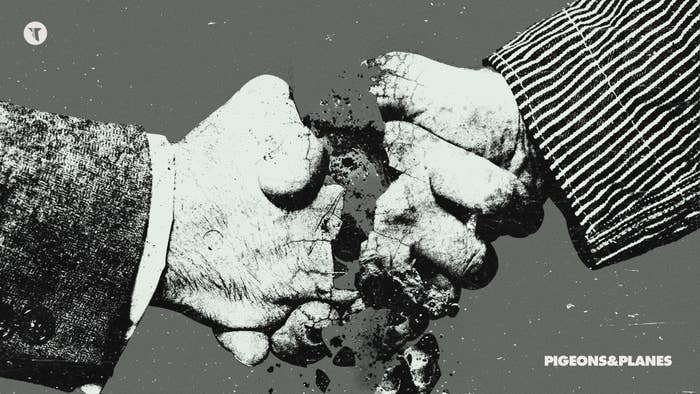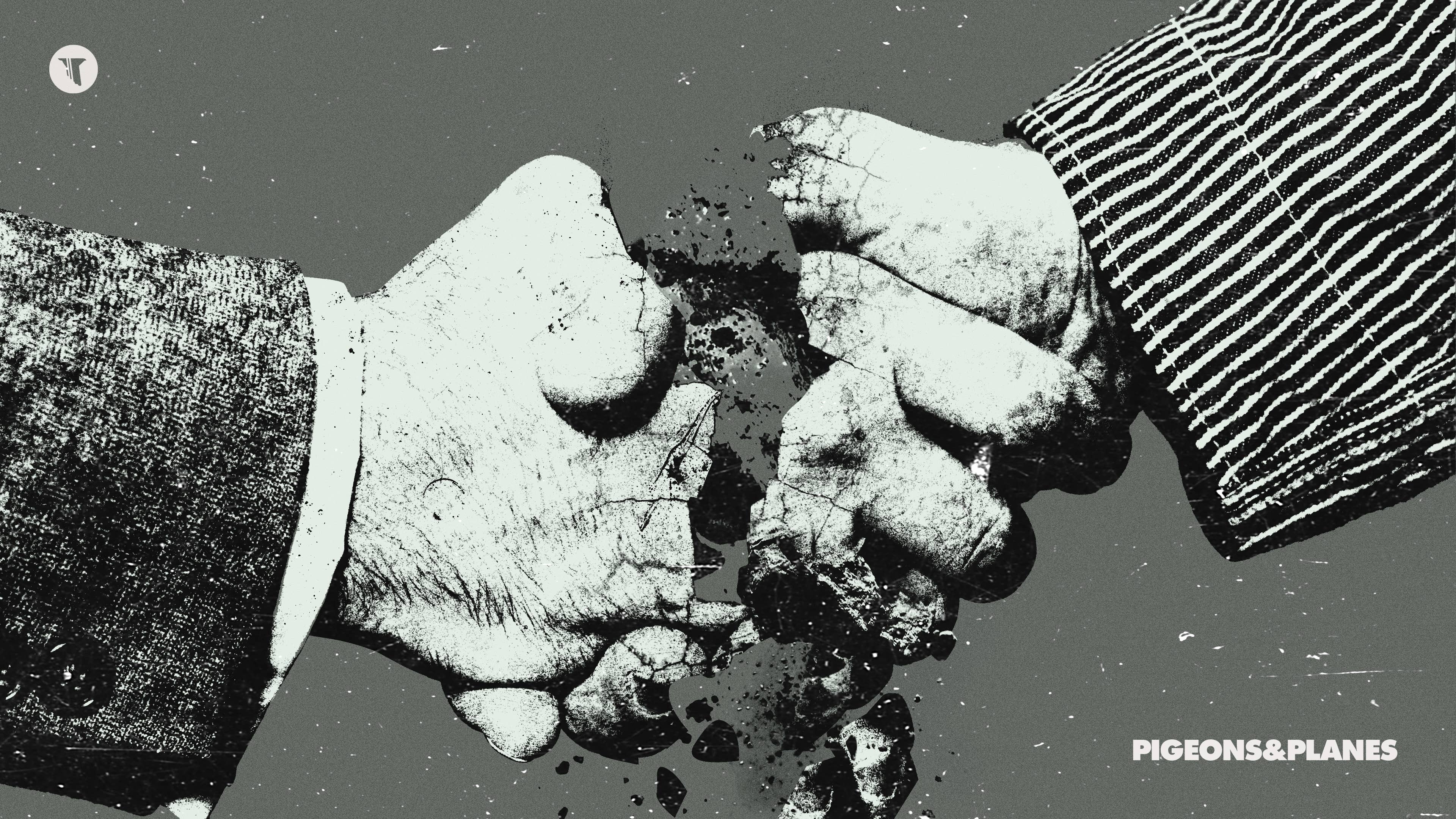
In July, Kreayshawn began trending on Twitter as the platform’s users monitored the revival of her breakout song “Gucci Gucci” on TikTok. While fans reminisced about the song’s impact through tweets and danced to it on TikTok, Kreayshawn asked the world not to listen to the song. “Don’t buy Gucci Gucci or stream it,” she wrote on Twitter. “I get 0$ and I’m in debt to Sony for 800k.” She then directed fans to some of her newer music that wasn’t released when she was signed to Columbia Records (a division of Sony).
The discussion then shifted to record labels being poisonous for artists when things don’t work out. Kreayshawn wasn’t the first—and won’t be the last—musician to pull back the curtain on the details of her label deal, especially in the age of viral stardom. Comparisons were made to Megan Thee Stallion’s situation with 1501 Entertainment, even though they are completely different. Misinformation began to spread about the nature of record deals, how they work, and what happens after they’re over. Collectively, this led to the realization that, as consumers of music, most of us don’t really know what’s going on. So what does this all mean? And what exactly is the relationship like between artists and labels in 2020, especially after they go their separate ways?
First, it’s important to understand the basics of what a record deal is: an agreement that legally binds an artist and a record label. Money is usually given to the artist by the label up front, but it will be made back, or “recouped,” in the form of royalties once said music is released. This is what’s known as an advance, and it’s something that is often a large selling part of a deal. But it isn’t just money to blow on houses, chains, and cars. “It’s for the recording costs, music video production costs, marketing, promotional expenses, independent promotion for radio, and often some financial support while an artist is touring,” says music lawyer Erin M. Jacobson, Esq. “It’s an investment by the label that covers marketing costs and more. Basically, the artist is still paying for everything, but the label is just fronting the money for the artist.”
"[The advance] is an investment by the label that covers marketing costs and more. Basically, the artist is still paying for everything, but the label is just fronting the money for the artist.” - Erin M. Jacobson, Esq.
This upfront payment means that the artist is not going to make money from music royalties until some significant returns are seen. “Before the label pays the artists any royalties on sales and streaming, they have to recoup the money that they invested,” says Erin. It can spell a headache for artists who, by luck, achieve success practically overnight. But at the same time, for people who come from poverty, the decision to sign can be a no-brainer. “One benefit to signing with a major label is the financial backing they provide, which is usually more than an independent artist can fund themselves,” she says. “However, those benefits also come with drawbacks such as the deals are more restrictive and most of the money the label fronts is a loan to the artist.”
Thanks to social media, it now seems easier than ever for musicians to get record deals. Soulja Boy was an early adopter in the late 2000s, using MySpace to push his music. More than a decade later, almost all successful artists are experts in turning online attention into dollar signs. It’s not unheard of for artists to sign million-dollar deals off a couple of songs—in fact, it’s becoming more common. But, according to Karl Fowlkes, a music lawyer and Music Industry Professor at Rowan University, although this temporary popularity gives “leverage for a short time frame to negotiate better deal points,” signing these deals aren't always in the artist’s best interest. “Finances are really the key,” Fowlkes says. “If your goal is to run it up and that is your version of capitalizing off of a viral moment, that multi-million dollar check might be your worst enemy sooner than later. But if you're able to use your viral moment to partner with a major label for good money and a short term, you are in great shape and can avoid those tragic viral artist stories.”
Trinidad James is one cautionary tale that could probably attest to this better than anyone. He went viral in September of 2012 thanks to his breakout song and video “All Gold Everything,” a divisive, animated record that became one of the biggest songs of the year. He signed a reported $2 million deal with Def Jam. When it was announced, then president Joie Manda said of him, ‘Trinidad James represents the cutting-edge of what’s happening in the culture today. We are thrilled to have him at the label, and look forward to growing his already massive buzz.”
For the next year and a half, James and the label were unable to keep the momentum of his initial release. His debut EP Don’t Be S.A.F.E. and follow-up mixtape 10 Pc Mild didn't perform as well as expected, and in 2014 he revealed to his fans what many had already predicted. “I should tell y’all,” he wrote on Twitter, “I got dropped from the Label. My Album is now free. If u hear ur beat or verse on it. I hope u want dap cuz I got no money.”
"If you're able to use your viral moment to partner with a major label for good money and a short term you are in great shape and can avoid those tragic viral artist stories.” - Karl Fowlkes
“Artists get dropped from labels when the company stops believing, or there’s some disgruntled issues between the artist and company that they’re signed to,” says Michael Clervoix, also known as Sha Money XL, a producer and songwriter who experienced James’ rise and worked with him at the studio. “The big publicized deal put more pressure on him, and his team made a big deal out of that, which was a bad move. The pressure was up on Joie (Manda), who signed him, and after that, I guess it was like, ‘Okay, we have to make this problem go away.’”
What happened with James is what can happen to anyone during the viral age. With so much emphasis on data and fast-rising social media hits, it seems to be all about the numbers, especially for major labels. That can turn into a problem if early success can’t be replicated. “At first, there was no pressure,” Clervoix says. “If you come in swinging a bat like how he was when he had the record, the only thing from there that’s expected is continued growth.”
To a certain extent, this is also what happened with Kreayshawn . Her debut album, Something ‘Bout Kreay, sold less than 4,000 copies and by 2014 she had made just one cent off the royalties, which she tweeted about incredulously. She’d gone viral with “Gucci Gucci” in 2011 and after similarly being unable to match the power of her breakout record, she was dropped from Columbia in 2013 and has since released music independently.
But here’s the thing: instead of wondering about whether the artists are able to move on afterwards, just check out what they’ve done since. Trinidad James has returned to music and independently released an album, Black Filter, in 2020. Kreayshawn, similarly, hasn’t missed a step and released an EP, T.O.B.M. this year, also raising money through music for the NAACP. They aren’t crying over spilled milk, and neither are the labels. “The benefit for artists in this situation is that if an artist does not recoup, they don’t have to pay back the advances and money that the label already spent, although they will also never receive royalties for as long as their account remains unrecouped,” says Erin. This is why Kreayshawn wanted millions of people to stream the song at one time—to clear her debt so that she could move on.
“After a deal is over, an artist and the label basically go their separate ways, but the label still has obligations to account to the artist,” Erin continues. “Sales and streaming still count towards an artist’s unrecouped balance, or the artist is paid royalties if the artist’s account is in a recouped position.” There’s another outcome that’s common, too: not being dropped, but instead being put on the backburner. “Your label might drop you but it’s more typical that you’ll just sit on the shelf,” says Fowlkes. “There is always the slim possibility that an artist regains steam and a label can recoup. With TikTok and Triller, we’ve seen songs resurrected from the dead to have a viral moment.”
So what should artists do? Sign with a record label or try and remain independent? There are successes on both sides of the equation: Cardi B likely recouped on her advance from Atlantic with the smashing success of her debut album, Invasion of Privacy. Chance The Rapper, who was vocal about not signing a record deal, has built success through creative partnerships outside the major label system. The decision is ultimately up to the artist to make—but they must do their due diligence and understand what leverage they have and how to use it. If an artist decides to pursue working with a major label, Erin has a suggestion of how to get the most bang for their creative buck. “The better deals for artists are generally those with shorter terms and lower advances because they allow artists to get out faster with less debt if things aren’t working out,” she says. “If an artist can work out any type of master ownership or reversion of ownership, it’s even better.”
That may be hard for an artist to do, but when they come into the label with “viral” attached to their name, it’s going to be a different ball game than with someone who’s been around for a long time. Fowlkes acknowledges this and wants to speak directly to artists looking to maximize their potential after a viral moment. “The expectations are extremely different for you than someone who has built a true catalog and fanbase,” he cautions. “If the first couple of songs don't perform, depending on who your A&R team is, it could be game over.”

